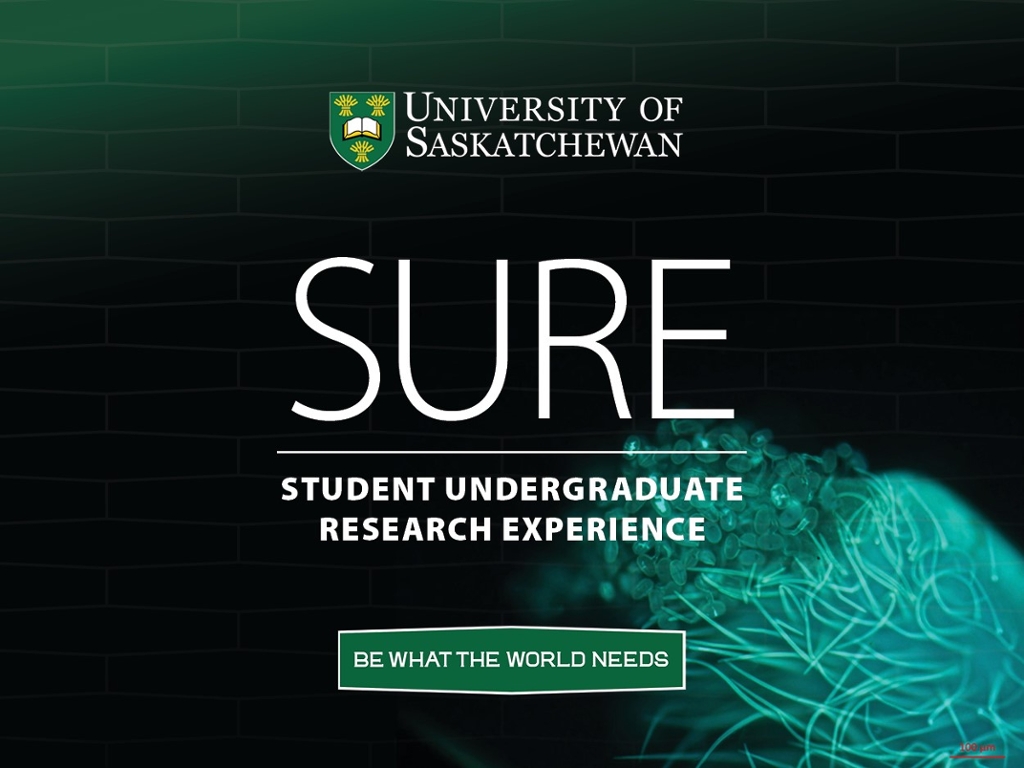
Launch of SURE: Student Undergraduate Research Experience
Student Undergraduate Research Experience (SURE), a USask pilot program spearheaded by the OVPR’s Undergraduate Research Initiative, held a program launch event online on May 5 which was attended by more than 100 USask undergraduate students.
By Merle Massie“Research is all about making mistakes,” explained recently-graduated USask toxicology student Sydney Murray to an online audience of more than 100 USask undergraduate students on May 5th, 2020. “Go into research with an open mind,” added Jory Litt-Jukes, another undergraduate researcher who is working with Dr. Christy Morrissey this summer. “You learn things by doing them, but you learn them better when you make a mistake.”
Murray and Litt-Jukes, along with fellow undergraduate students Sarah Foley and Tasker Wanlin were guest speakers for the launch of SURE: Student Undergraduate Research Experience. The foursome offered lively reassurance to incoming undergraduate student researchers. “Learn to ask questions,” added Wanlin, “because it’s the best way to get through your problems.”
SURE is a USask pilot program designed to connect undergraduate student researchers from across the campus, and to offer a number of student-focused training and events. Spearheaded by the Undergraduate Research Initiative in the Office of Vice-President Research, SURE is supported by a wide range of on-campus student and research support services, such as the University Library, Social Sciences Research Laboratory, Research Services and Ethics, Safety Services, Student Employment and Career Centre, and the Morning Star Lodge research group.
The student panel was the highlight of the kickoff event. Each speaker brought experience and perspective to the question: “what do you wish you had known as an undergraduate researcher?”
Tasker Wanlin, who is returning this year for another summer working as an undergraduate researcher, this year with Dr. Brian Eames of the Department of Medicine, offered a memory: “I did not exactly know what to expect when becoming a USRA student. I was nervous that I wasn’t going to like research, I wasn’t going to be good at it, or that I would crumble.” What he discovered, though, is that nervousness can be channeled, and that it means something quite different: “being nervous means that you care, and that you are going to do a good job, because you care about it.”
Both Litt-Jukes and Murray added a measure of reassurance and reality. Your supervisors, Murray noted, have been through that process of learning, of doing things the first time. They understand what you are going through. Litt-Jukes added, it’s not so much the final research outputs or new findings as the energy and commitment that matter: “if you put in a good day’s work, then they are happy with you.”
Sarah Foley, an experienced editor with USURJ, University of Saskatchewan Undergraduate Research Journal, joined the panel in a dual capacity: as an incoming first-time USRA student with Dr. Christy Morrissey, and as a USURJ editor. Foley led a short presentation on how students undertaking summer research projects have a USask-based research journal accepting submissions. “Every student that conducts research at USask is eligible to publish with USURJ,” Foley explained, adding that the publishing process is well-supported through editorial review and faculty oversight, including seminars to help students improve writing skills.
The University of Saskatchewan has long taken pride in its exceptional support for undergraduate student research. From the First Year Research Experience to the student undergraduate research journal, USURJ, to honours projects to experiential classes, USask leads the world in innovative, sustained commitment to undergraduate student research. The SURE pilot adds another layer of support.
USask SURE pilot lead Merle Massie notes that the COVID-19 crisis added a measure of urgency to this initiative. So many faculty-led projects have pivoted to pursuing more desk-based research work, such as literature searches and comprehensive reviews, analysis of existing data, writing for publication, or moving their collection methodology online. Whereas undergraduate research training under non-COVID conditions might have concentrated on data collection, this year the goal, outputs and expectations have shifted.
To that end, SURE has been designed as a portal for students to access made-for-SURE live training and event webinars offered by campus partners, combined with easy access to existing and incoming campus or national research training. Its first two events showcased that SURE has hit a nerve: over 100 students were on hand for the kickoff webinar, and over 80 attended online to hear Susan Murphy of USask Library offer hints, tips and tricks to conduct a thorough literature search. All SURE sessions will be recorded and posted to the website throughout the summer term, capping off with an online research symposium at the end of summer. For an expanded view of upcoming events available to undergraduate student researchers, visit the SURE website.
------------------------------------------------------------------------------------------------------------

